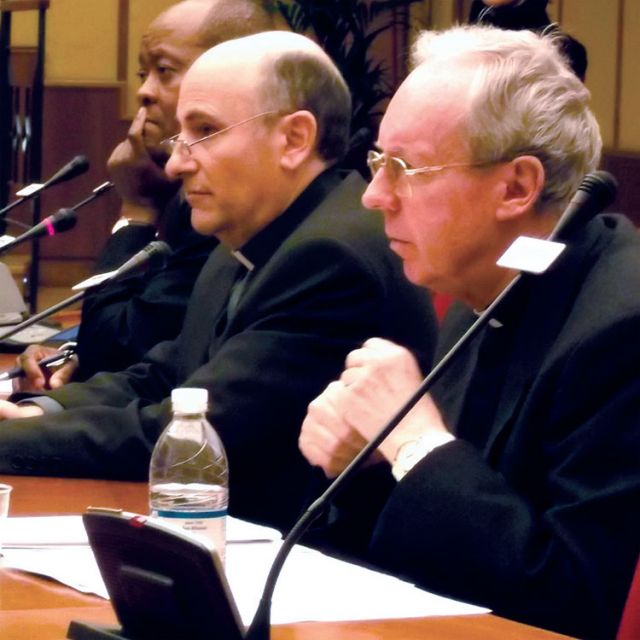Fr. Michael Paul Gallagher, S.J., offered this discourse on Lonergan as Therapy for Confused Cultures at a four-day international conference in Rome last month, dedicated to the renowned philosopher and theologian. The Irish Jesuit was one of about three dozen speakers at the “Revisiting Lonergan’s Anthropology” conference, Nov. 27-30, organized by the Pontifical Gregorian University and partially sponsored by the Canadian Jesuit province. Lonergan taught Christology and Trinity at the Gregorian from 1953 to 1964.
University rector Fr. François-Xavier Dumortier, S.J., said the conference was intended to coincide with the 60th anniversary of the start of Lonergan’s teaching there. He called Lonergan “an important figure in contemporary theology” and announced eventual plans to open a Lonergan Centre at the Gregorian.
Lonergan’s thought, Gallagher said, undermines and overcomes cultural hesitations and confusions about truth, “caused by an exclusively scientific approach to religion, which has made truth impossible.”
“Modernity continues to cast its long shadow on the field of fundamental theology,” he said. “As the grandchildren of modernity, we remain painfully caught in a dualism between the objectification of the world and the subjectification of value.”
The first therapy for this cultural malaise, Gallagher proposed, is “the horizon of being in love.”
“Theology should retrieve the religious experience as the foundation for theology,” he said. The divorce between theology and religious experience should be healed, and theologians should appropriate their own faith as the foundation for their work, shifting it from text to interiority, he said.
The old foundations of theology were externalist. But with Lonergan, the new foundations hinge on the authentic or inauthentic interior drama of the personally converted theologian.
Gallagher went on to offer three more “therapies,” the second directed at the elimination of “the stubborn myth about reality.” He proposed Lonergan’s understanding of intellectual conversion as central “to overcome our insecurities on how we know religious truth.”
The third therapy is directed at reversing cultural decline. Theology has a transformative commitment within human history, he said, and “is called to mediate God-given redemption for the healing of history.”
The fourth therapy is a map to navigate the maze of complexity in order to move forward and to promote progress in history.
“Lonergan can help us to recognize the complexity of religious experience,” he said. Most people live in the realm of common sense most of the time, he explained. But it is only through interiority that one can come to differentiations of consciousness and to knowledge of oneself.
Fr. Gerry Whelan, S.J., said conference organizers wanted to emphasize Lonergan’s relevance and contribution 50 years after the start of the Second Vatican Council and the applicability of his thought and method in actual practice. In addition to historical and theological papers then, presenters expounded on how they use Lonergan in various fields, including interreligious dialogue, bioethics, ecology, education and public health. At least six speakers were from Canada.
Speaking on the environmental crisis, Cristina Vanin of St. Jerome University in Waterloo, Ont., spoke of the applicability of Lonergan’s three aspects of conversion to ecological issues and to the development of ecological conversion.
Dr. William Sullivan, a general practitioner at St. Michael’s Hospital and Surrey Place Residence in Toronto, shared how the International Association of Catholic Bioethicists, of which he is a founder, uses Lonergan’s method and functional specialities to work through difficult bioethical issues and then come to a consensus statement and policy recommendations.
Ecclesiologist Catherine Clifford, professor at Ottawa’s Saint Paul University, expounded on how Lonergan has been helpful in ecumenical and interreligious dialogue. Ecumenical dialogue, she said, is a means to conversion and ecclesial self-transcendence. She said Romans 5:5 was for Lonergan the “theological justification of Catholic dialogue with all Christians.” Lonergan’s cognitive intentionality, based on the structure of human consciousness and not on any Christian doctrine, she added, explains his wide appeal among academics, non-believers and non-Christians, and for inter-church dialogue.
“In theology, Lonergan’s project was to do for our day what Aquinas did for his,” offered Jeremy Wilkins, director of the Lonergan Research Institute at Regis College in Toronto. “Aquinas showed how theology could be integrated with Aristotelian science, which in the 13th century was the best available. Comparably, Lonergan shows us how theology can be integrated with modern science and historical studies, in order to be on the level in our time.”
Lonergan was born in Buckingham, Que., in 1904. He studied at Loyola College in Montreal, prior to entering the Jesuits in 1922. He pursued his doctoral studies in theology at the Gregorian. During his illustrious career, he taught at Loyola College, the Gregorian, Regis College, Boston College and Harvard University. He died at the age of 80 in the Jesuit infirmary in Pickering, Ont.
Lonergan published extensively. His most famous book remains Method in Theology and Insight: A Study in Human Understanding. The University of Toronto Press is currently editing a 25-volume series of his collected works.
(Ieraci is a Canadian freelance writer in Rome.)

